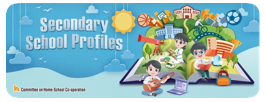Integrated STEM_SCIENCE
Science education has to prepare students to cope with the rapid advancement in science and technology. The primary aim of our science education at the junior secondary level is to ensure that students develop the necessary scientific and technological knowledge and skills to live and work in the 21st century.
Our syllabus emphasizes a balanced approach towards the acquisition of scientific knowledge, attitudes and skills through carefully organized activities. The investigative approach, which involves students in defining problems, designing experiments to find solutions, carrying out practical work and interpreting the results, should be employed. Such investigations would enhance the acquisition of knowledge and skills as well as contribute towards other educational goals such as cultivation of citizenship, development of appropriate social and personal values and appreciation and respect for life. To achieve these ends, it is necessary to link science education to technological applications, social issues, and the daily experiences of students. Learning science in these contexts will be more interesting and effective.
The content of our syllabus has been carefully chosen to ensure continuity and progression of science education across the primary and secondary levels. Students are presented with aspects of science that are interesting and best contribute to their general education. It is expected that upon completion of the course students shall acquire the basic foundation for more academic pursuit in the discipline of science in senior secondary education. To help students keep up with advances in science and technology, teachers should feel free to incorporate current issues that are relevant and interesting into their lessons. For example, the use of modern technology in measurement and control should be introduced where appropriate.
It is important to note that the sequencing of topics in our syllabus does not suggest a teaching order. Schemes of work and assessment should be drawn up by teachers in a manner commensurate with the needs, interest and abilities of their students. Teachers are advised to adopt a variety of approaches in their teaching and incorporate ideas as well as materials from the everyday experiences of their students.
AIMS
Based on the broad aims, it is possible to identify the general objectives for the syllabus as follows:
- Knowledge and understanding
Students should be able to demonstrate knowledge and understanding in relation to- some phenomena, facts and concepts in science
- some scientific vocabulary and terminology
- some applications of science in society and students’ everyday life
- Scientific method and problem solving skills
Students should be able to- ask relevant questions, suggest ideas and make predictions
- select and apply facts and concepts learnt to solve problems
- propose hypotheses and devise methods for testing them
- analyze data, draw conclusions and make further predictions
- Laboratory techniques
Students should be able to- handle apparatus and chemicals safely and properly
- carry out instructions for experiments
- observe and describe objects and experimental results accurately
- select appropriate apparatus and suggest experimental procedures
- Communication skills
Students should be able to- extract relevant information from a variety of sources
- manipulate simple numerical and other data
- interpret scientific information from data presented in diagrammatic, numerical, tabular and graphical forms
- organize and present information in a clear and orderly manner
- argue for or against the use of science in technological situations based on scientific, ethical, economic, political and social considerations
- communicate scientific ideas and values with one another
- Decision making skills
Students should be able to- make objective judgements based on data and arguments presented with scientific, ethical, economic, political and social considerations
- support value judgement using appropriate and relevant scientific facts and knowledge
- Attitude
Students should- develop curiosity and interest in science
- be aware of the importance of the safety of oneself and others in the laboratory and be committed to safe practices in daily life
- develop personal integrity through honest recording of experimental data
- develop an awareness of scientific advancement and its social, economic, environmental and technological implications
- be willing to communicate and comment on issues related to science and respect the decisions of others
- develop a positive attitude in enhancing personal and community health
- show concern for the care of the environment and a willingness to contribute to it
Details of Program Plan
- Gifted Students Education: Biotech Research Team taking part in research works such as
- Cancer image analysis collaborate with HKU Dental and Medical Schools research team
- Cancer drugs development collaborate with HKU Medical School research team
- Seagrass biodiversity in HK collaborate with HKU Department of Biological Science
- Gifted Students Education: Science School Team taking part in competitions such as
- HK Youth Science and Technology Invention Competition
- International Junior Science Olympiad (Hong Kong Screening)
- Joint School Science Exhibition
- eLearning such as book and flipped classroom
- Joint school ‘STEAM’ competition
- Life wide learning day and activities
- Reading skills training (cross-curriculum development with English Department)
- Innovative Maker Fortnights
- Reading Schemes
Department Heads:
- Mr. Kwan SM (Assistant Vice-Principal) (Science)
- Dr. Chan KY (College Lecturer) (Biotechnology, Science Research)
Members:
- Mr. Chu SC
- Ms. Lam LM
- Ms. Law HY
- Ms. Leung MN
- Ms. Liu YM
Laboratory Technicians:
- Ms. Wong HM
- Mr. Wong TK
Useful Websites:
- 香港科學館
http://www.lcsd.gov.hk/CE/Museum/Science/
- 香港太空館
https://hk.space.museum/en/web/spm/home.html
- 香港資訊教育城
https://resources.hkedcity.net
- 中大物理園
http://www.phy.cuhk.edu.hk/phyworld/
- 美國太空總署
- 宏觀和微觀之間
http://micro.magnet.fsu.edu/primer/java/scienceopticsu/powersof10/index.html
- 視覺謬誤
http://encyclozine.com/Gallery/Illusions/
- 諧振迴旋圖
http://encyclozine.com/Science/Mathematics/Graphs/Encyclo/
- Interactive Physics
http://www.phy.cuhk.edu.hk/phyworld/sergey_kisel/index.html
- 超媒體自學中心
http://www.ied.edu.hk/has/phys/
- 光碟機的運作原理
http://micro.magnet.fsu.edu/electromag/java/cd/

 m.TNKJSC(Mobile)
m.TNKJSC(Mobile)  x.TNKJSC(moXo)
x.TNKJSC(moXo)  b.TNKJSC(liBrary)
b.TNKJSC(liBrary) 